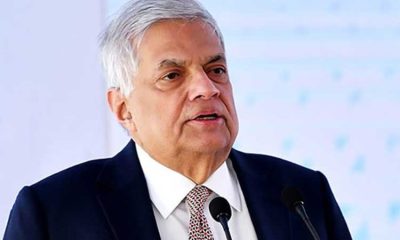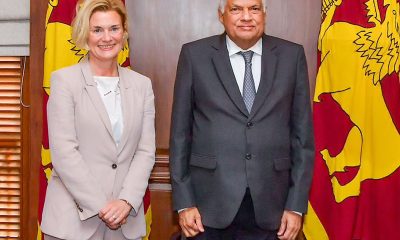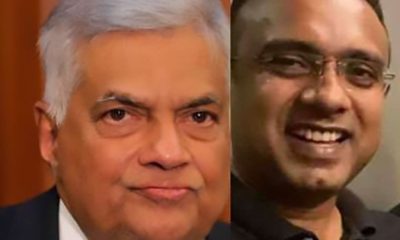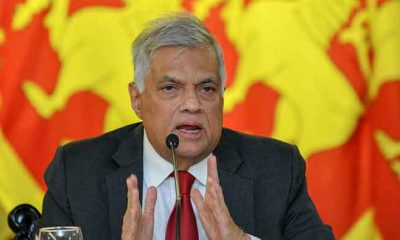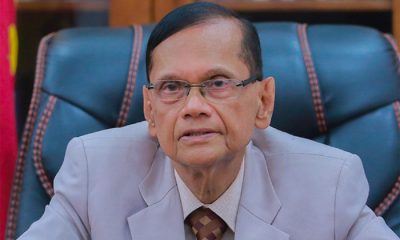Editorial
Inspiring young minds

Friday 13th October, 2023
A model parliamentary session held by a group of schoolchildren from Ratnapura, at the Presidential Secretariat, on Tuesday, has received much publicity. President Ranil Wickremesinghe, addressing the students, asked them to suggest solutions to their problems. The government was willing to consider them, he added.
Tuesday’s event has come in for criticism on social media. Some critics have called it an utter waste of time and energy, and argued that children should be taught to spend their time productively without engaging in fruitless pursuits, but such criticism, in our book, is misplaced. Parliament is an integral part of democracy, and theoretically model parliaments or simulated legislative assemblies are intended to promote civic education, help students or the youth gain a deeper understanding of how parliamentary process works and provide them with opportunities to develop skills in public speaking, debating and critical thinking.
Negative comments about the mock parliament emanate from the people’s antipathy towards the present-day legislators and the deterioration of the parliamentary process. The blame for this unfortunate situation should be apportioned to the public as well; it is they who elect their representatives. In a democracy, the people are said to get the governments they deserve, and the same may be said of parliaments as well.
However, the general consensus is that the current legislature needs to be given a radical shake-up. This task requires a Herculean effort like the one that went into the cleaning of the Augean stables. Going by what has been reported of Tuesday’s model parliamentary session, there is a lot that our MPs could and should learn from schoolchildren. In fact, on seeing the appalling conduct of some of the legislators, one wonders whether they missed early childhood education, which provides a solid base for learning abilities and cognitive and social development.
Schoolchildren who go on excursions to the zoo and Parliament during stormy sessions might wonder which is which, and, most of all, why it is the harmless, dumb creatures that are kept in cages, and not the aggressive ones that go berserk at the drop of a hat. There have been instances where schoolchildren in the public gallery of Parliament let out screams on seeing rowdy scenes below, with the MPs trading blows and raw filth liberally. It is a matter for relief that children are not emulating those legislators.
It is said that there is no way one can isolate oneself from politics unless one isolates oneself from society. But one important lesson that should be imparted to children in school is that one does not necessarily have to engage in active politics to be able to make a significant contribution to the wellbeing of one’s country. There are many other ways of serving the public and achieving success in life. But when children see professors and other such learned persons in politics kowtowing to semi-literate ministers, they are likely to get the wrong message that it is prudent to drop out of school as early as possible, engage in politics and become ministers.
There is a pressing need for children to be educated on civic and political rights of the public and inspired to cherish justice, fair play, unity in diversity and equality so that the current practice of deifying politicians, especially the parasitic ones with dictatorial traits, will end, and future generations will have the courage to stand up for themselves. For this goal to be achieved, undue social recognition for politicians has to be diminished. Hence, care should be taken to prevent model parliaments from creating an impression in young minds that politicians are a cut above others. Children must be taught and encouraged to think differently and critically and question the retrogressive policies, traditions and beliefs.
Teachers ought to set an example to their students by refraining from tugging their forelocks before politicians. They must overcome the absurd mindset that no school function is complete without the presence of politicians. There are many brilliant Sri Lankans of all ages who have excelled in their chosen fields and made this country proud. It is they who deserve pride of place. Tharushi Karunarathne’s stellar performance at the recently-concluded Asian Games proved an enormous uplift for a despondent nation mired in deep crisis.
The 18-year-old lass, a proud member of the Raramuri squad of the Walala Rathnayake Central College, as it were, was poetry in motion, and ‘even the ranks of Tuscany could scarce forbear to cheer’ when she clinched the gold medal in the women’s 800m. But if not for her coach, Susantha Fernando, who spotted her talent and turned her into a formidable half-miler who moves like the breeze, Tharushi would have ended up being another Lucy of Lanka in a far-flung hamlet––‘a violet by a mossy stone/Half-hidden from the eye!’ Susantha has trained dozens of athletes, and the international medals he has helped the country win, all these years, number more than three scores. It is such selfless, unsung heroes/heroines who should be invited to grace ceremonies, as chief guests, especially in schools. That, we believe, is the way to foster meritocracy for the benefit of children.
Editorial
Ensure safety of COPF Chairman

Saturday 8th June, 2024
It was with shock and dismay that we received the news about death threats to COPF (Committee on Public Finance) Chairman Dr. Harsha de Silva over the ongoing parliamentary probe into the on-arrival visa scam. Dr. de Silva yesterday told Speaker Mahinda Yapa Abeywardena, in Parliament, that he was facing death threats and intimidation, and it was incumbent upon Parliament to ensure his safety. He stopped short of naming names, but revealed that some ruling party MPs were among those who had ganged up against him. The Speaker only said there had been no complaint, and he would look into the matter.
The SLPP-UNP government has been doing everything in its power to have all parliamentary committees under its thumb. The COPE (Committee on Public Enterprises), which once helped restore public faith in the legislature by exposing state sector corruption, has now become a mere appendage of the incumbent regime, thanks to the appointment of SLPP MP Rohitha Abeygunawardena as its Chairman. The SLPP-UNP combine also tried to oust COPF Chairman Dr. de Silva, but in vain. However, it knows more than one way to shoe a horse.
The COPF, under Dr. de Silva’s chairmanship, has been a thorn in the side of the government, which is struggling to cover up numerous corrupt deals. Dr. de Silva yesterday told Parliament that he found it extremely difficult to function as the COPF head due to severe resource constraints his committee was facing; he himself had to pay the salaries of some of his staff members besides burning the midnight oil.
The sheer workload he had to cope with as the COPF chief had taken its toll on his health, he said, informing the Speaker that he was at the end of his tether, and at times thought of resigning from the COPF. This is exactly what the government wants him to do; resource squeezes and threats are aimed at making him quit.
On 26 May, Dr. de Silva revealed, in an ‘X’ post, that the COPF had uncovered some vital information about the visa scam and it would reveal everything after its final meeting on the issue; the COPF was committed to exposing the truth behind the controversial tender, he added. In an editorial comment on 27 May, we warned him.
While thanking him for his bold stand, we pointed out that by making such a statement, he had thrown caution to the wind, and become a marked target, with the government making an all-out effort to delay the COPF investigation lest the truth should come out much to the detriment of its interests in this election year. Unfortunately, what was feared has come about; Dr. de Silva is complaining of death threats and government moves to strangulate the COPF financially to derail its investigations.
Dr. de Silva’s predicament exemplifies the fate that befalls the few good men and women in Parliament. It is hoped that all those who seek an end to the state sector corruption will rally behind Dr. de Silva, and bring pressure to bear on the government to ensure his safety. Let Dr. de Silva be urged to reveal the names of those who have issued threats, veiled or otherwise, to him and are trying to scuttle the COPF probes.
Editorial
Dead man walking!

Friday 7th June, 2024
The SLPP-UNP government is going hell for leather to make bad laws as if there were no tomorrow. It is abusing its parliamentary majority, which has been retained with the help of some crossovers, for that purpose. The Opposition, the media and trade unions are up in arms, and understandably so. The incumbent regime is a dead man walking; it is so desperate that it is capable of anything. Hence the need for it to be restrained.
The Electricity (Amendment) Bill (EAB) plunged Parliament into turmoil yesterday, but the government secured its passage. The Supreme Court (SC) determined the entire EAB inconsistent with the Constitution and recommended changes thereto. After unveiling the Bill, sometime ago, Minister of Power and Energy Kanchana Wijesekera hailed it as an excellent piece of legislation aimed at straightening up the power sector to serve the public interest better.
The SC determination left him with egg on his face. He reminded us of the proverbial curate who, while eating a stale egg, assured his host, a Bishop, that parts of it were excellent. Wijesekera’s egg, as it were, made Parliament stink yesterday, but he sought to please his masters by praising it as a silver bullet.
EAB should have been discarded and a new one drafted in consultation with all stakeholders. But the government is apparently driven by an ulterior motive; its aim is not to serve Sri Lanka’s interests but to look after those of some moneybags.
It is not uncommon for Bills to contain some flaws, which are rectified either before or during the committee stage. But there is something terribly wrong with draft Bills that are full of sections inconsistent with the Constitution. The drafters of EAB have demonstrated their sheer ignorance of the supreme law, and that they are not equal to the task of drafting Bills. If they had read the Constitution at least perfunctorily, they would not have drafted such a bad law.
Ignorant and incompetent, they do not deserve to be paid with public funds and must be sent back to law school. They must be summoned before Parliament and questioned on their serious lapses, which have caused public faith in the national legislature to diminish.
Curiously, the MPs who demand that judges, doctors, Central Bankers, and other public officials be summoned before Parliament have taken badly drafted Bills for granted. The power sector trade unions yesterday alleged that EAB was of Indian origin and geared towards furthering the interests of Adani Group at the expense of Sri Lanka.
Most critics of EAB are agreeable in principle to the need for power sector reforms; the Ceylon Electricity Board should be given a radical shake-up, and transformed into a modern organisation capable of providing a better service at a lower cost. They only asked the government to tread cautiously, consulting all stakeholders and taking action to ensure that the country’s interests prevailed over everything else. But the government was in a mighty hurry to steamroller the Bill through Parliament, making the Opposition ask whether it was doing so at the behest of some external forces involved in controversial power generation deals here.
What is passed by the current Parliament can be either amended or abolished by a future parliament in a constitutionally prescribed manner. But that does not mean that a government is free to pass bad laws, making the country enter into long-term agreements with powerful nations and their investors. It looks as if the SLPP-UNP regime did not care two hoots about the consequences of its actions.
Editorial
Modi Magic on the wane

Thursday 6th June, 2024
The outcome of India’s parliamentary election (2024) has led to a ‘perspective ambiguity’. Prime Minister Narendra Modi lost no time in declaring victory for the BJP-led NDA alliance, which secured 293 seats in the 543-member Parliament, but he must be a worried man. The BJP is short of 32 seats to form a government under its own steam; it has lost 63 seats or about 20% of its parliamentary strength. It had 303 seats in the previous Parliament, and that number has dropped to 240.
Modi has become the second Indian Prime Minister to win a third term. The first PM to do so was Jawaharlal Nehru. But Nehru won an outright majority in Parliament in 1962; Modi has had to depend on smaller parties in his alliance to retain his hold on power. Modi must be reeling from a sharp drop in his victory margin in his own constituency, Varanasi; it has decreased to 152,000 from 480,000 in 2019 whereas Modi’s bete noire, Rahul Gandhi, won Raebareli by a staggering 390,000 votes.
Modi, who reigned supreme with 303 seats in the previous Parliament, is now dependent on parties such as Nitish Kumar’s JD-U and Chandrababu Naidu’s TDP to form a government. He has had to lead an alliance of strange bedfellows. Both Kumar and Naidu were bitter critics of Modi. Kumar helped form the oppositional alliance, the INDIA bloc, before switching his allegiance to PM Modi. Naidu also closed ranks with the BJP in the run-up to the election. These politicians have been described as extremely ambitious and highly unpredictable, and whether Modi will be able to manage them and consolidate his grip on the NDA alliance remains to be seen. They will demand plum ministerial posts in return for their support. The TDP is said to be eyeing Transport and Health portfolios! That is the name of the game in coalition politics, where it is not uncommon for the tail to wag the dog, so to speak. These two political leaders are however not the only problem Modi will have to contend with. The next five years will feel like an eternity for PM Modi.
Nothing would have been more shocking for the BJP than its defeat in Uttar Pradesh’s Faizabad constituency, where the Ram Mandir has been built. Modi may have thought he would be able to win the Lok Sabha election hands down after the consecration of that temple, which became a centrepiece of the BJP’s election campaign. The BJP lost that seat to the Samajwadi Party! Modi must be disappointed that the Ram Mandir hype failed to trigger a massive wave of support for his party. This particular defeat signifies a massive setback for the BJP’s ethno-religious agenda.
Modi’s divisive election campaign failed to yield the desired result. The BJP’s failure to secure an outright majority could be attributed to a host of factors, some of them being the suppression of the Opposition, the arrogance of power, chronic unemployment, and the rising cost of living. The BJP also did not care to reimage itself in a positive light to attract the youth.
Modi will hereafter see the Congress-led INDIA bloc with 223 seats, in his rearview mirror. The Congress (99 seats) and its allies have eaten into the BJP support base considerably, but they have a long way to go before being able to capture power.
The bumpy ride ahead for the BJP-led coalition government to be formed may improve the INDIA bloc’s chances of bettering their electoral performance and turning the tables on the BJP and its allies in time to come. Modi will have a lot to worry about in his third term.


